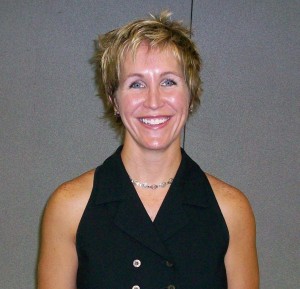 Story by Renee Baker, EDGE Publications,
Story by Renee Baker, EDGE Publications,
Every day, she travels 40 miles. Not in her car, but on her bike and on patrol. Police Officer Laura Martin serves as the LGBT Liaison Officer for the Dallas Police Department, and she was recently at the Resource Center to speak to the Metroplex Crossdressers Club (MCDC) about her role with the police department and issues of safety.
Safety is often of utmost concern to openly transgender individuals, and knowing that they have the backing of the Dallas PD is reassuring. Martin’s personal visit to MCDC reinforced that assurance.
MCDC is a nonprofit organization that has a local legacy of supporting crossdressers and transgender women since the 1970’s. Rebecca Lynn White, President of MCDC, says that MCDC provides a “safe haven” for transgender individuals.
White, who identifies as a transwoman, is in the midst of her own transition to female. She says her biggest concern is when she goes into “new environments” as she doesn’t know what to expect. She doesn’t know if she will find acceptance and feel safe. In particular, she prefers to avoid the bar scene in the Oak Lawn area as it can “get rowdy”.
Not all feel unsafe, though. Anna Sparks, Secretary/Treasurer for MCDC, says she really hasn’t had any issues of safety other than being approached by a few “strange guys” in gay bars. But, she does agree that for many, “they are terrified of just walking out the door”. According to Sparks, the bigger issue is employment and coming out at work more so than safety.
Still, transgender individuals are reported to be murdered at rates much higher than any other minority group, but statistics are not tracked by the FBI so exact numbers are unknown. The viciousness of attacks on transgender individuals, according to Nancy Nangeroni, does at least corroborate that these are hate crimes. Nangeroni is a former Executive Director of the International Foundation for Gender Education.
According to Carrie Wise, a sergeant of the North West Division of the Dallas Police Department, there has only been one Dallas hate crime reported in the last year.
Wise, who also attended the MCDC meeting, recommends that people go out in groups and to be aware of one’s surroundings. She says more than anything, “It is not gender, but windows of opportunities for crooks.”
Wise is proud of the work that the DPD is doing. She says, “The officers in this area are hard working. They are out here to put bad guys in jail and you gotta love ’em for that.”
Even so, not all officers within a department will necessarily be supportive or knowledgeable of the LGBT community, which is why Martin acts as a liaison. She says she acts as a “point of contact for LGBT individuals that don’t want to call a random police officer.”
The recent brutal beating of transgender woman Duanna Johnson by Memphis cops in February of this year is indicative that discrimination is still a potential within any police force.
Martin says that while every rookie in the DPD receives four hours of LGBT training, one hour specifically on transgenderism, not all LGBT police on the force are out of the closet. In fact, she says most gay cops are not. As to why, she says “for various personal reasons.”
Though she did not comment upon LGBT discrimination inside the DPD, she said she “has not heard of a single case in which an LGBT officer was not backed because they were gay.”
Martin also addressed the MCDC group regarding the “bathroom issue”. For crossdressers and transgender individuals, it is not always clear which restrooms are safe and legal. Martin says, “It is not against the law to use the restroom.” She says to use the restroom that corresponds to the gender you are presenting in.
Dallas Ordinance 24927, which was passed under Mayor Laura Miller in 2002, includes the prohibition of discrimination based upon sexual orientation, where sexual orientation was defined as including an individual’s “real or perceived gender identity”.
Martin said even with such an ordinance, “Any private business can kick a person from their business.” She says if it is private property, then you are only allowed on that property by privilege. She said for example, if a restaurant asks you to leave, then you have to leave. And you have to pay your bill too regardless of whether or not you are kicked out. “You can be arrested for not paying your bill.”
Martin is optimistic about the changes in the DPD and their LGBT training course. She says their goal is not so much about gaining acceptance, but rather about acknowledgement and respect. She encourages police officers to respect transgender individuals as well and to be direct about asking a person’s legal gender if they are unsure. She says, “I encourage male officers to get female officers to search those presenting as female.” By doing so, it shows respect to the individual.
For more information on MCDC and the Resource Center, visit www.metrocd.com and www.rcdallas.org.
For more on this story, see here.